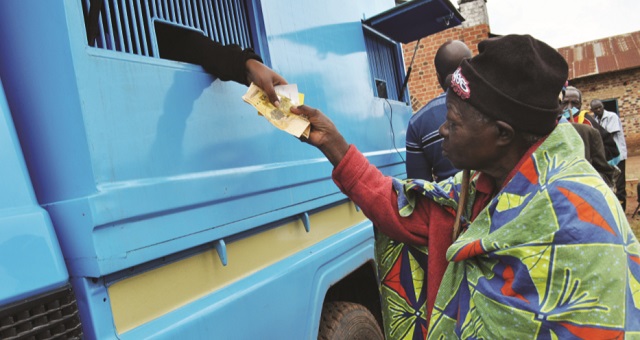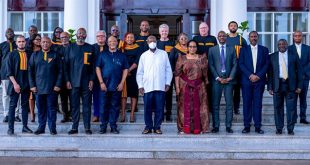
But not all agree that Shs25, 000 per month for those over 65 years improves lives
Kampala, Uganda | RONALD MUSOKE | “Everybody in Uganda needs social protection,” says Dr. Fred Muhumuza, a development economist based at Makerere University Kampala.
Muhumuza was speaking on Feb. 21 at the Irish Ambassador’s residence in Kampala during a reception organized by the envoy to “recognise the progress made by Uganda towards building a national social protection system.”
Pension Watch, an online resource that focuses on non-contributory (social) pensions around the world, says there were 1,467,466 people in Uganda aged over 60 years (3.3% of the total population) in 2018.
Ireland and the UK have since 2011 been propping up a pilot programme in which the government gives selected senior citizens in selected districts a stipend of Shs 25,000 per month.
Muhumuza sounded impressed but demanded more. He noted that the average Ugandan employee takes home Shs200, 000 for a month’s work.
“When you divide the Shs200, 000 with 30 days, you get Shs7, 000 per day but an average household has seven people,” Muhumuza said.
“It’s like everybody in Uganda needs social protection,” he concluded to show how Shs25, 000 a month cannot offer social protection to the vulnerable.
Government officials familiar with the social protection programme for the elderly say beneficiaries tend to spend their grants on food, healthcare, and education. They say it has caused significant improvements in the nutritional status, health, and well-being of recipients and members of their households. It has also kept children in school.
Some beneficiaries have also been using the grant to purchase livestock, farm implements and to hire labour. The Social Assistance Grants for Empowerment (SAGE) also has wider community impacts, and in districts where it has been implemented, both employment and wages have risen.
But Muhumuza said social protection is about having a wide range of programmes which are meant to prevent, manage or overcome situations that adversely affect the welfare of citizens.
“Social protection is more than handouts (to the older people); you need to look at hospitals, schools and other infrastructure that support these vulnerable people in their communities.”
William Carlos, the Irish Ambassador to Uganda said the benefits of investing in social protection alongside investments in other essential sectors like education, health; energy and infrastructure are obvious in socially cohesive societies.
“These benefits protect people against crises and poverty while generating long-term and sustainable economic growth,” he said.
Carlos said Ireland had committed Shs62 billion to the second five year phase of the Expanding Social Protection Programme, ending in 2020. When combined with the contributions of Uganda and the UK, almost Shs390 billion will have been invested in the sector over the coming five year period. But 2020 is also the year the donors are supposed to pull out their support for this programme.
Carlos said the uptake and thus expansion of social protection in Uganda is a critical step that the country needs to take as it transits to middle income status.
“It is also important that the roll out does not compromise the quality, as well as the results achieved in the early stages.”
Stipend for the elderly
Stephen Kasaija, the head of the Expanding Social Protection programme management unit under the Ministry of Gender, Labour and Social Development told The Independent on Feb.28 that since 2011, the programme had so far reached out to 157,000 people in 61 districts. This is about 10% of older persons in the country (people aged 65 years and above).
In the districts where the pilot has been going on for the last eight years, the programme has been popular and the envy of neighbouring districts and as a result there have been calls to the government for the programme to be rolled out to the whole country.
Help Age International, a non-profit that advocates for the welfare of senior citizens, says many older people in Uganda struggle to bring in a reliable income and are vulnerable to living in poverty.
Many also live in chronic ill health or have disabilities that limit their ability to lead independent lives and participate in their local communities. Help Age International says on its website that the government needs to expand its grant to older people that is being piloted in only a few districts as well as help older people access existing poverty reduction programmes.
In October, 2017, Parliament passed a motion directing the Ministry of Gender, Labour and Social Development to present a plan for the roll out of the programme to all districts. But with the Irish and British governments expected to pull out in 2020, The Independent understands the government has been reluctant to scale up the programme nationwide.
 The Independent Uganda: You get the Truth we Pay the Price
The Independent Uganda: You get the Truth we Pay the Price




I introduce to your kindness my “Giant” Dream Project benefiting Elderly with this brief highlight:
We Serve Above Self, but………. “AT 70 AND ABOVE, WHO CARE !?”
I look forward for a Grantor cooperation with the Elderly Project to donate for an Individual of 70 years, and above five-fold RIGHT of: 1.0 A conducive Shelter and Bedding 2.0 A Nutritional Diet 3.0 Medical Treatment Cleared 4.0 Testator Succession Will Management Services provision 5.0 Clientele Inclination to Faith in God.
Example:
Donation of $100 promotes 1 acre vegetables feeding 5 Elderly in their 5 nuclear families for 6 months.
Fr John Francis Mutebi PHF
August 12, 2019 at 2:12 am
I introduce to your kindness my “Giant” Dream Project benefiting Elderly with this brief highlight:
We Serve Above Self, but………. “AT 70 AND ABOVE, WHO CARE !?”
I look forward for a Grantor cooperation with the Elderly Project to donate for an Individual of 70 years, and above five-fold RIGHT of: 1.0 A conducive Shelter and Bedding 2.0 A Nutritional Diet 3.0 Medical Treatment Cleared 4.0 Testator Succession Will Management Services provision 5.0 Clientele Inclination to Faith in God.
Example:
Donation of $100 promotes 1 acre vegetables feeding 5 Elderly in their 5 nuclear families for 6 months.
Fr John Francis Mutebi PHF –
Proprietor and Projects Director of NGO: St. Joseph’s Mayo Uganda
http://www.mayouganda.org
August 12, 2019 at 2:12 am
Partnering with a Youth-directed NPO: St. Joseph’s Mayo Uganda, registration number 4372, as Implementer, I introduce to your kindness a “Giant” Dream Project with Start Small – Seed Grants benefiting the Elderly briefly high-lit, thus:
We Serve Above Self, but………. “At 70 (years) and above, WHO CARE !?”
I look forward for a Grantor cooperation with donation to the Elderly Project in Uganda of age 70 years, and above for five-fold RIGHT of: 1.0 A conducive Shelter and Bedding 2.0 A Nutritional Diet 3.0 Medical Treatment Cleared 4.0 Testator Succession Will Management Services provision 5.0 Clientele Inclination to Faith in God.
How can you help care the Elderly? Donations include:
1.0 US$1000 can facilitate three days Workshop / Training of thirty Youths on how to care for a Elderly;
2.0 One Apple-banana sucker, given eighteen months of organic attention at US$6 begins commercial fruition of US$4.5 every after 6 months, that will become a dessert for an Elderly diet;
3.0 One trained Counselor at US$20 facilitation each day can reform and skill thirty Youths given three months of interaction on matters of their Elderly five-fold Rights (above);
4.0 One month local chicken (cock) at US$1.5 can make thrice gross profit after four months with ordinary feeds;
5.0 US$1000 clears major medical bills for three Elderly vulnerable Patients;
6.0 US$1000 secures bedding of blanket, towel and bed-sheets to 14 Elderly for 3 years of comfort;
7.0 US$1000 furnishes an Elderly shelter within 14 days to a conducive home of permanent residence.